who, which引导的定语从句
- 格式:doc
- 大小:26.50 KB
- 文档页数:1
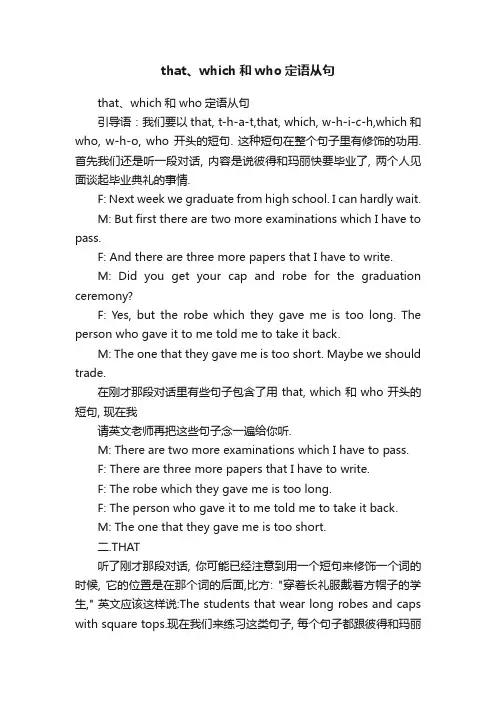
that、which和who定语从句that、which和 who定语从句引导语:我们要以that, t-h-a-t,that, which, w-h-i-c-h,which和who, w-h-o, who 开头的短句. 这种短句在整个句子里有修饰的功用.首先我们还是听一段对话, 内容是说彼得和玛丽快要毕业了, 两个人见面谈起毕业典礼的事情.F: Next week we graduate from high school. I can hardly wait.M: But first there are two more examinations which I have to pass.F: And there are three more papers that I have to write.M: Did you get your cap and robe for the graduation ceremony?F: Yes, but the robe which they gave me is too long. The person who gave it to me told me to take it back.M: The one that they gave me is too short. Maybe we should trade.在刚才那段对话里有些句子包含了用 that, which 和 who 开头的短句, 现在我请英文老师再把这些句子念一遍给你听.M: There are two more examinations which I have to pass.F: There are three more papers that I have to write.F: The robe which they gave me is too long.F: The person who gave it to me told me to take it back.M: The one that they gave me is too short.二.THAT听了刚才那段对话, 你可能已经注意到用一个短句来修饰一个词的时候, 它的位置是在那个词的后面,比方: "穿着长礼服戴着方帽子的学生," 英文应该这样说:The students that wear long robes and caps with square tops.现在我们来练习这类句子, 每个句子都跟彼得和玛丽快要毕业有关系. 现在请你注意听男老师念句子. 然后跟着女老师把句子重复一遍.M: There are two more examinations that Peter has to pass.F: There are two more examinations that Peter has to pass.M: There are three more papers that Mary has to write.F: There are three more papers that Mary has to write.M: Most students that graduate this year will attend the graduation ceremony.F: Most students that graduate this year will attend the graduation ceremony.M: The students that wear long robes and caps with square tops are graduating.F: The students that wear long robes and caps with square tops are graduating.三.WHICH刚才那些句子里用来修饰的`短句都是用that 开头的, that 可以用来指人或是东西. 但是在专门指东西或事情的时候可以用 which, w-h-i-c-h, which 代替. The robe that they gave Mary is too long. 这句话也可以这样说: The robe which they gave Mary is too long.下面我们作一组练习, 学学这种句子, 练习的作法是由老师用"" what 提出一个问句, 比方 "什么是文凭?" What is a diploma? 然后老师念一个用 which开头的短句修饰的词, 比方 "高中毕业生得到的文件" The paper which a high school graduate receives, 所以刚才那个问题的答案就是: "文凭是高中毕业生得到的文件." A diploma is the paper which a high school graduate receives. 在这组练习里, 你可以学习到怎么用英文来解释什么是"学位" degree, d-e-g-r-e-e, degree, 什么是 "毕业舞会" prom, p-r-o-m, prom 等等. 现在请你注意听老师问问题, 并且在学生回答问题的时候也一起回答.M: What is a graduation robe?M: the robe which the graduates wearF: A graduation robe is the robe which the graduates wear.M: What is a graduation ceremony?M: a ceremony which the graduates attendF: A graduation ceremony is a ceremony which the graduates attend.M: What is a diploma?M: the paper which a high school graduate receivesF: A diploma is the paper which a high school graduate receives.M: What is a degree?M: the paper which a university or college graduate receives F: A degree is the paper which a university or college graduate receives.M: What is a prom?M: the dance which the graduates go toF: A prom is the dance which the graduates go to.四.WHO下面我们来学习用 who, w-h-o, who 作刚才那种短句, 比方有一句话: "老师就是教书的人" A teacher is a person who teaches. 在这句话里, who 指的就是"人" person p-e-r-s-o-n, person.下面我们来作一组练习,首先由老师提出一个疑问句. 比方: "谁将在典礼上致辞?" Who will give a speech at the ceremony? 接着老师念出一个用 who 开头的短句修饰的词. 比方: "参加毕业典礼的官员们" The officials who attend the graduation ceremony. 所以刚才那个问题的答案就是: "参加毕业典礼的官员们将在典礼上致辞." The officials who attend the graduation ceremony will give a speech at the ceremony. 现在请你注意听老师问问题, 并且在学生回答问题的时候也一起回答.M: Who will wear long robes and caps with square tops?M: the students who graduateF: The students who graduate will wear long robes and caps with square tops.M: Who will attend the graduation ceremony?M: the students who graduateF: The students who graduate will attend the graduation ceremony.M: Who will receive a diploma?M: the students who graduate from high schoolsF: The students who graduate from high schools will receive a diploma.M: Who will receive a degree?M: the students who graduate from universities or colleges F: The students who graduate from universities or colleges will receive a degree.M: Who will make a speech at the ceremony?M: the graduate who has the best record in schoolF: The graduate who has the best record in school will makea speech at the ceremony.五.从句修饰宾语现在我们再来学习用短句. 在刚才作的几组练习里用的短句都是用来修饰主语的. 下面我们要用这种短句来修饰宾语. 比方有一句话: "父母和朋友向毕业的学生祝贺. "Parents and friends congratulated the students who graduated. 在这句话里, 短句 who graduated 修饰句子里的宾语the students.下面我们来作一组练习把两句简单的话合并成用短句修饰宾语的句子. 练习的作法是这样的: 老师先念一个句子 "彼得跟学生闲谈" Peter chatted with the students, 接着老师又念第二个句子 "典礼中坐在他附近的学生" The students sat near him at the ceremony.请你用who 把第二个句子改为短句, 用来修饰第一句话里的 "学生", 所以答案就是 Peter chatted with the students who sat near him at the ceremony. 现在我们开始作练习, 每作完一句还是请你听正确答案.M: Peter talked to the student.M: The student gave a speech at the graduation ceremony.F: Peter talked to the student who gave a speech at the graduation ceremony.M: Peter chatted with the students.M: The students sat near him at the ceremony.F: Peter chatted with the students who sat near him at the ceremony.M: Parents and friends congratulated the students.M: The students graduated.F: Parents and friends congratulated the students who graduated.M: Students met their friends and relatives.M: Their friends and relatives came to the graduation ceremony.F: Students met their friends and relatives who came to the graduation ceremony.M: The graduates took pictures of their friends.M: Their friends were in the same classes.F: The graduates took pictures of their friends who were in the same classes.下面我们用同样的方式练习怎么用以which 开头的短句来形容一个句子的宾语, 比方老师说: "学生听演讲" Students listened to the speech. 接着老师又说:"校长在典礼中演讲" The principal gave a speech at the ceremony. 你就把第二句话改成短句来修饰第一句话里的宾语 " 演讲", 所以正确答案就是 Students listened to the speech which the principal gave at the ceremony. 好, 现在我们开始作练习, 每作完一句就请你听正确答案.M: Mary didn't like the robe.M: She got the robe for the graduation ceremony.F: Mary didn't like the robe which she got for the graduation ceremony.M: Mary wore the robe.M: She traded the robe with Peter.F: Mary wore the robe which she traded with Peter.M: Students listened to the speech.M: The principal gave a speech at the ceremony.F: Students listened to the speech which the principal gave at the ceremony.M: Students were very happy to receive the diplomas.M: They earned the diplomas.F: Students were very happy to receive the diplomas which they earned.M: Students showed each other the pictures.M: They took the pictures.F: Students showed each other the pictures which they took.M: Students danced to the music.M: The band played music at the prom.F: Students danced to the music which the band played at the prom.六.听短文回答问题今天我们要听的文章是谈到美国中学和大学的毕业典礼. 文章里许多句子都是我们刚才练习过的, 比方哪些学生可以毕业, 在典礼上谁致辞, 典礼之后举行毕业舞会, 毕业典礼是令人回味的活动等等.现在请你注意听.In American high schools and colleges, the last day of the school year is graduation day. The students who finish their last year in the school will graduate. The graduation ceremony is often in the school gymnasium. The people who come to watchthe graduation are teachers, parents and friends of the graduates. Those students who will graduate will wear long robes and caps with square tops. The graduate who has the best record in school will make a speech. The school principal and other officials will also make speeches. Then each graduate will receive a piece of paper which has his name and the name of the school. The paper which the students receive in high school is a diploma. The paper which the students receive in college is a degree. After the ceremony, students often chat with their teachers, friends and relatives who come to congratulate them. They take pictures of each other. They will show each other these pictures a few nights later at the graduation prom. Graduation is a memorable event.刚才那段文章你听懂了吗? 等一会儿我会请英文老师再用慢速度念一遍给你听. 现在我们先来听今天测验的三个问题.第一个问题是:M: Who attends the graduation ceremony?第二个问题是:M: What do graduates do at the ceremony?第三个问题是:M: What do students often do after the ceremony?现在我们再听英文老师用慢速度把整段文章念一遍.In American high schools and colleges, the last day of the school year is graduation day. The students who finish their last year in the school will graduate. The graduation ceremony is often in the school gymnasium. The people who come to watch the graduation are teachers, parents and friends of the graduates. Those students who will graduate will wear long robes and caps with square tops. The graduate who has the best record in school will make a speech. The school principal and other officials will also make speeches. Then each graduate will receive a piece ofpaper which has his name and the name of the school. The paper which the students receive in high school is a diploma. The paper which the students receive in college is a degree. After the ceremony, students often chat with their teachers, friends and relatives who come to congratulate them. They take pictures of each other. They will show each other these pictures a few nights later at the graduation prom. Graduation is a memorable event.现在请你回答今天测验的三个问题, 回答之后请你听老师念正确答案.第一个问题是:M: Who attends the graduation ceremony?F: The school principal, officials,the graduates, their teachers, parents and friends attend the graduation ceremony.第二个问题是:M: What do graduates do at the ceremony?F: They listen to speeches, and they receive diplomas or degrees.第三个问题是:M: What do students often do after the ceremony?F: They chat with their teachers, friends and relatives.They also take pictures of each other.下载全文。
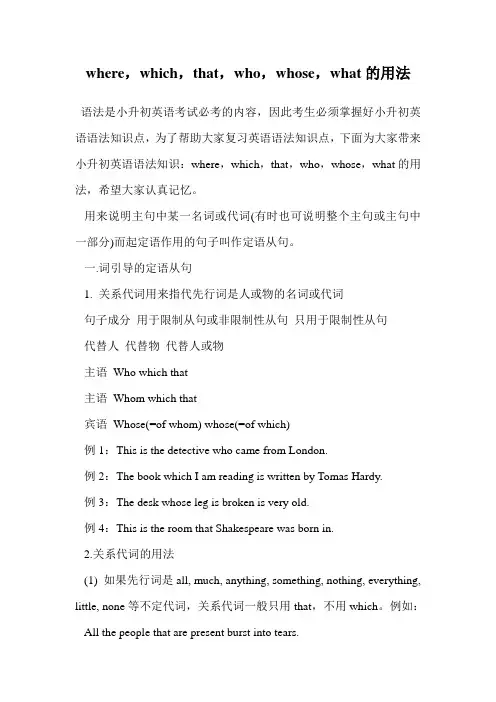
where,which,that,who,whose,what的用法语法是小升初英语考试必考的内容,因此考生必须掌握好小升初英语语法知识点,为了帮助大家复习英语语法知识点,下面为大家带来小升初英语语法知识:where,which,that,who,whose,what的用法,希望大家认真记忆。
用来说明主句中某一名词或代词(有时也可说明整个主句或主句中一部分)而起定语作用的句子叫作定语从句。
一.词引导的定语从句1. 关系代词用来指代先行词是人或物的名词或代词句子成分用于限制从句或非限制性从句只用于限制性从句代替人代替物代替人或物主语Who which that主语Whom which that宾语Whose(=of whom) whose(=of which)例1:This is the detective who came from London.例2:The book which I am reading is written by Tomas Hardy.例3:The desk whose leg is broken is very old.例4:This is the room that Shakespeare was born in.2.关系代词的用法(1) 如果先行词是all, much, anything, something, nothing, everything, little, none等不定代词,关系代词一般只用that,不用which。
例如:All the people that are present burst into tears.(2) 如果先等词被形容词最高级以及first, last, any, only, few, mush, no, some, very等词修饰,关系代词常用that,不用which, who,或whom。
例如:(3) 非限制性定语从句中,不能用关系代词that,作宾语用的关系代词也不能省略。
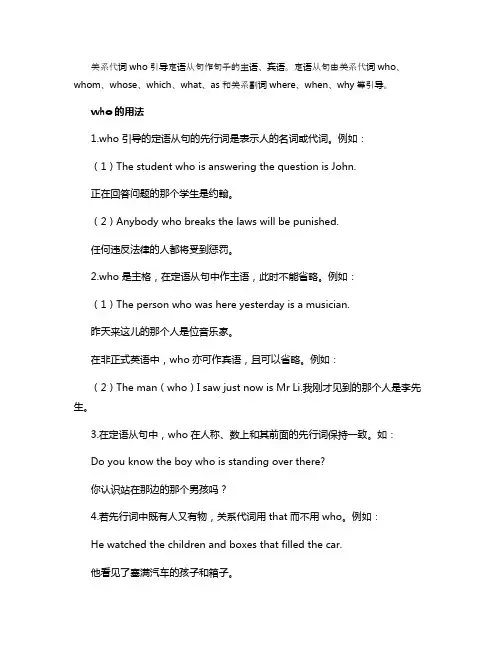
关系代词who引导定语从句作句子的主语、宾语。
定语从句由关系代词who、whom、whose、which、what、as和关系副词where、when、why等引导。
who的用法1.who引导的定语从句的先行词是表示人的名词或代词。
例如:(1)The student who is answering the question is John.正在回答问题的那个学生是约翰。
(2)Anybody who breaks the laws will be punished.任何违反法律的人都将受到惩罚。
2.who是主格,在定语从句中作主语,此时不能省略。
例如:(1)The person who was here yesterday is a musician.昨天来这儿的那个人是位音乐家。
在非正式英语中,who亦可作宾语,且可以省略。
例如:(2)The man(who)I saw just now is Mr Li.我刚才见到的那个人是李先生。
3.在定语从句中,who在人称、数上和其前面的先行词保持一致。
如:Do you know the boy who is standing over there?你认识站在那边的那个男孩吗?4.若先行词中既有人又有物,关系代词用that而不用who。
例如:He watched the children and boxes that filled the car.他看见了塞满汽车的孩子和箱子。
5.若先行词前面有形容词最高级、序数词修饰,关系代词用that而不用who。
例如:(1)Yao Ming is the best basketball player that I know.姚明是我知道的最好的篮球运动员。
(2)Tom is the first boy that left the room.汤姆是第一个离开这个房间的男孩。
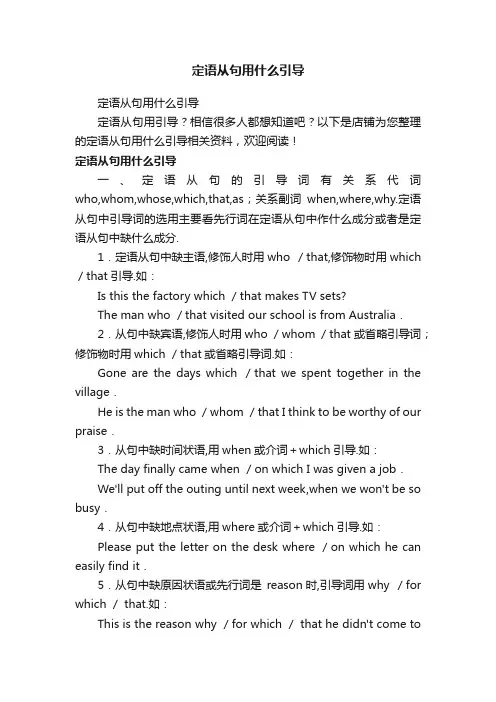
定语从句用什么引导定语从句用什么引导定语从句用引导?相信很多人都想知道吧?以下是店铺为您整理的定语从句用什么引导相关资料,欢迎阅读!定语从句用什么引导一、定语从句的引导词有关系代词who,whom,whose,which,that,as;关系副词when,where,why.定语从句中引导词的选用主要看先行词在定语从句中作什么成分或者是定语从句中缺什么成分.1.定语从句中缺主语,修饰人时用who /that,修饰物时用which /that引导.如:Is this the factory which /that makes TV sets?The man who /that visited our school is from Australia.2.从句中缺宾语,修饰人时用 who /whom /that或省略引导词;修饰物时用which /that或省略引导词.如:Gone are the days which /that we spent together in the village.He is the man who /whom /that I think to be worthy of our praise.3.从句中缺时间状语,用when或介词+which引导.如:The day finally came when /on which I was given a job.We'll put off the outing until next week,when we won't be so busy.4.从句中缺地点状语,用where或介词+which引导.如:Please put the letter on the desk where /on which he can easily find it.5.从句中缺原因状语或先行词是reason时,引导词用why /for which / that.如:This is the reason why /for which / that he didn't come tothe meeting.6.从句中缺定语,人和物都用 whose引导.如:A child whose parents are dead is called an orphan.Please pass me the dictionary whose cover is black.7.当先行词是way时,其定语从句的引导词用in which /that.如:The way in which /that he looks at problems is wrong.二、引导词as可引导限制性定语从句,也可引导非限制性定语从句.1.在固定词组the same...as,such...as中,as引导限制性定语从句.如:He is not such a fool as he looks.I've bought the same dress as she is wearing.2.当先行词是整个主句时,可用as /which引导非限制性定语从句.引导词as和which的区别在于:①as引导的非限制性定语从句可放于主句前、主句中、主句后,而which引导的非限制性定语从句一般放于主句后或句中.②as常与从句中的know,see,hear,expect等动词连用,也常用于as often happens,as is often the case(常有的`事)等句子中;而which一般不用于以上情况.③as有“正如”的含义,which没有此含义.如:As is well known,Shanghai is a big city.Some of the roads were flooded,which made our journey more difficult.三、关系代词who,whom,whose,which和as能引导非限制性定语从句,而that不能;非限制性定语从句中即使缺宾语,引导词也不能省略;关系副词when,where能引导非限制性定语从句,而why不能.如:Abraham Lincoln,who led the United States through the Civil War years,was shot on April 14,1865.四、先行词是物时,其引导词可用 which也可用that,通常情况下二者可互换,但在有些情况下不能.1.用which不用that引导定语从句的三种情况:①非限制性定语从句用which,不用that引导.如:Football,which is a very interesting game,is played all over the world.②先行词为that时,为了避免重复,定语从句用which不用that引导.如:That which you borrowed from me wasn't a real diamond necklace.③介词后用which不用that引导.如:The method with which you solved the problem is very good.2.用that不用which的七种情况:①先行词前有形容词最高级或序数词修饰时,用 that不用which引导.如:This is the best place that I have ever visited.The second question that is asked is why we don't fall off the earth.②先行词为little,much,all,none,few,(the)one,something,everything,nothing,anything等不定代词时,用that 引导.如:There is nothing in the world that can frighten him.③先行词既有指人的名词又有指物的名词时,用 that引导.如:He told us about the people and the cities that he had visited.④先行词前有any,all,no,few,every,some,little,much,(the)very,(the)only,(the)last等词修饰时,用 that引导.如:This is the very coat that I need.Is oxygen the only gas that helps fire burn?⑤先行词为which时,为了避免重复,用that引导.如:Which is the book that you bought yesterday?⑥先行词在从句中作表语时,常用that引导.如:Shanghai is no longer the city that it used to be in the 1930's.⑦当主句是There be...句型时,用that引导.There are two tickets for the film that are for you two.五、在“one of+复数名词+定语从句”结构中,从句的谓语动词应与复数名词保持一致;当one前有the only修饰时,从句的谓语动词应与the only one保持一致.如:He was one of the students who were late for class.He was the only one of the students who was late for class.六、引导词前有介词或短语介词时,修饰人只能用 whom,修饰物只能用which引导.如:My glasses,without which I was like a blind man,fell to the ground and broke.The man,by whom the wolf was shot,is called Jackson.【定语从句用什么引导】。
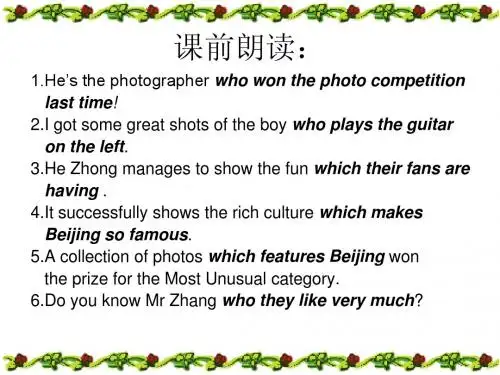
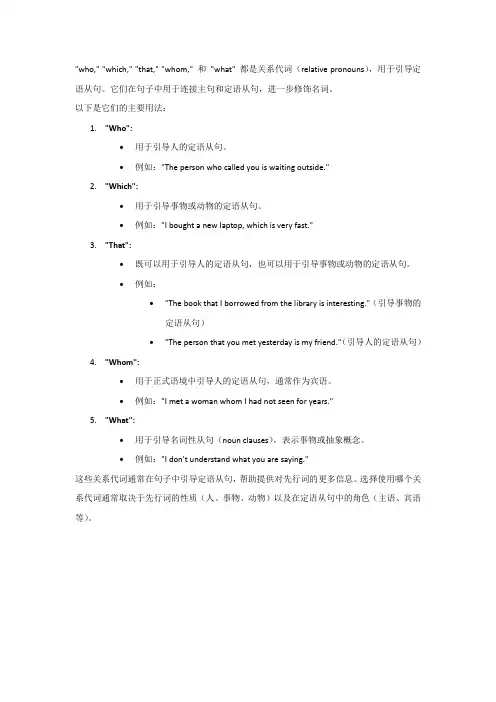
"who," "which," "that," "whom," 和"what" 都是关系代词(relative pronouns),用于引导定语从句。
它们在句子中用于连接主句和定语从句,进一步修饰名词。
以下是它们的主要用法:1."Who":•用于引导人的定语从句。
•例如:"The person who called you is waiting outside."2."Which":•用于引导事物或动物的定语从句。
•例如:"I bought a new laptop, which is very fast."3."That":•既可以用于引导人的定语从句,也可以用于引导事物或动物的定语从句。
•例如:•"The book that I borrowed from the library is interesting."(引导事物的定语从句)•"The person that you met yesterday is my friend."(引导人的定语从句)4."Whom":•用于正式语境中引导人的定语从句,通常作为宾语。
•例如:"I met a woman whom I had not seen for years."5."What":•用于引导名词性从句(noun clauses),表示事物或抽象概念。
•例如:"I don't understand what you are saying."这些关系代词通常在句子中引导定语从句,帮助提供对先行词的更多信息。
选择使用哪个关系代词通常取决于先行词的性质(人、事物、动物)以及在定语从句中的角色(主语、宾语等)。
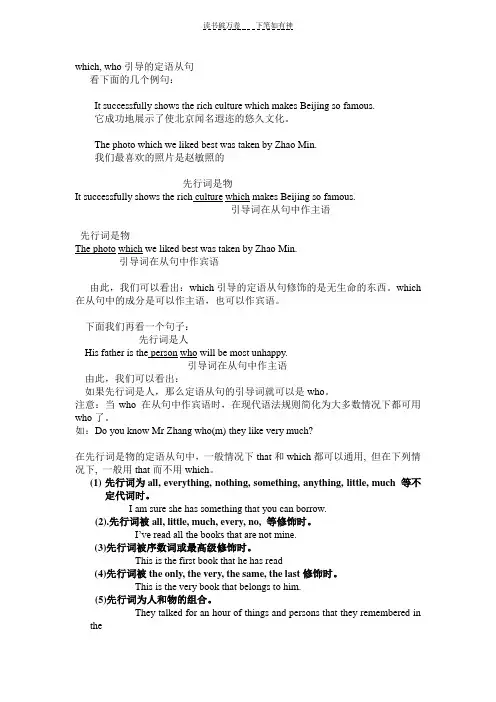
which, who引导的定语从句看下面的几个例句:It successfully shows the rich culture which makes Beijing so famous.它成功地展示了使北京闻名遐迩的悠久文化。
The photo which we liked best was taken by Zhao Min.我们最喜欢的照片是赵敏照的先行词是物It successfully shows the rich culture which makes Beijing so famous.引导词在从句中作主语先行词是物The photo which we liked best was taken by Zhao Min.引导词在从句中作宾语由此,我们可以看出:which引导的定语从句修饰的是无生命的东西。
which 在从句中的成分是可以作主语,也可以作宾语。
下面我们再看一个句子:先行词是人His father is the person who will be most unhappy.引导词在从句中作主语由此,我们可以看出:如果先行词是人,那么定语从句的引导词就可以是who。
注意:当who 在从句中作宾语时,在现代语法规则简化为大多数情况下都可用who了。
如:Do you know Mr Zhang who(m) they like very much?在先行词是物的定语从句中,一般情况下that和which都可以通用, 但在下列情况下, 一般用that而不用which。
(1)先行词为all, everything, nothing, something, anything, little, much 等不定代词时。
I am sure she has something that you can borrow.(2).先行词被all, little, much, every, no, 等修饰时。
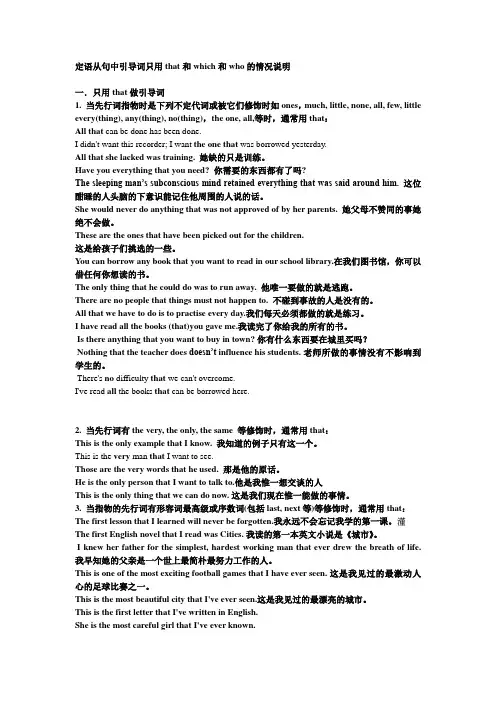
定语从句中引导词只用that和which和who的情况说明一.只用that做引导词1. 当先行词指物时是下列不定代词或被它们修饰时如ones,much, little, none, all, few, little every(thing), any(thing), no(thing),the one, all,等时,通常用that:All that can be done has been done.I didn't want this recorder; I want the one that was borrowed yesterday.All that she lacked was training. 她缺的只是训练。
Have you everything that you need? 你需要的东西都有了吗?The sleeping man’s subconscious mind retained everything that was said around him. 这位酣睡的人头脑的下意识能记住他周围的人说的话。
She would never do anything that was not approved of by her parents. 她父母不赞同的事她绝不会做。
These are the ones that have been picked out for the children.这是给孩子们挑选的一些。
You can borrow any book that you want to read in our school library.在我们图书馆,你可以借任何你想读的书。
The only thing that he could do was to run away. 他唯一要做的就是逃跑。
There are no people that things must not happen to. 不碰到事故的人是没有的。
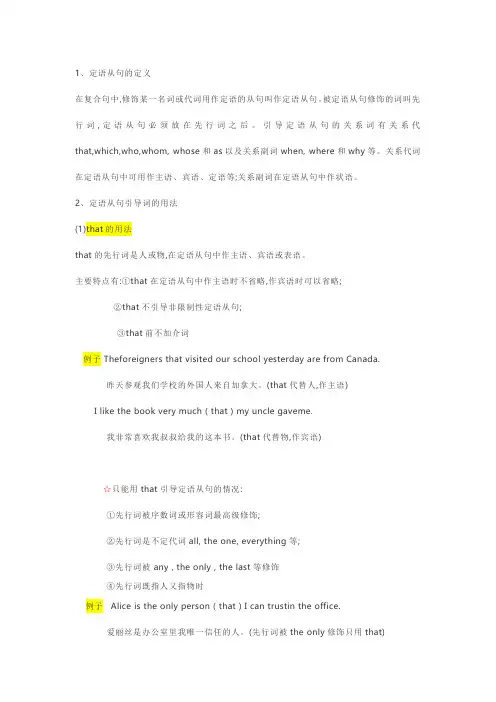
1、定语从句的定义在复合句中,修饰某一名词或代词用作定语的从句叫作定语从句。
被定语从句修饰的词叫先行词,定语从句必须放在先行词之后。
引导定语从句的关系词有关系代that,which,who,whom, whose和as以及关系副词when, where和why等。
关系代词在定语从句中可用作主语、宾语、定语等;关系副词在定语从句中作状语。
2、定语从句引导词的用法(1)that的用法that的先行词是人或物,在定语从句中作主语、宾语或表语。
主要特点有:①that在定语从句中作主语时不省略,作宾语时可以省略;②that不引导非限制性定语从句;③that前不加介词例子 Theforeigners that visited our school yesterday are from Canada.昨天参观我们学校的外国人来自加拿大。
(that代替人,作主语)I like the book very much ( that ) my uncle gaveme.我非常喜欢我叔叔给我的这本书。
(that代替物,作宾语)☆只能用that引导定语从句的情况:①先行词被序数词或形容词最高级修饰;②先行词是不定代词all, the one, everything等;③先行词被 any , the only , the last等修饰④先行词既指人又指物时例子Alice is the only person ( that ) I can trustin the office.爱丽丝是办公室里我唯一信任的人。
(先行词被the only修饰只用that)(2)which的用法先行词是物,在定语从句中作主主语或宾语。
主要特点:①which在定语从句中作主语时不能省略,作宾语时可以省略,引导非限制性定语从句时不能省略;②which的前面可以有介词;③which的先行词可以是前面数个的的句子,意为”这使…….;这一点……”。
例子 A computeris a machine which can do many things for us.电脑是一种可以为我们做许多事情的机器。
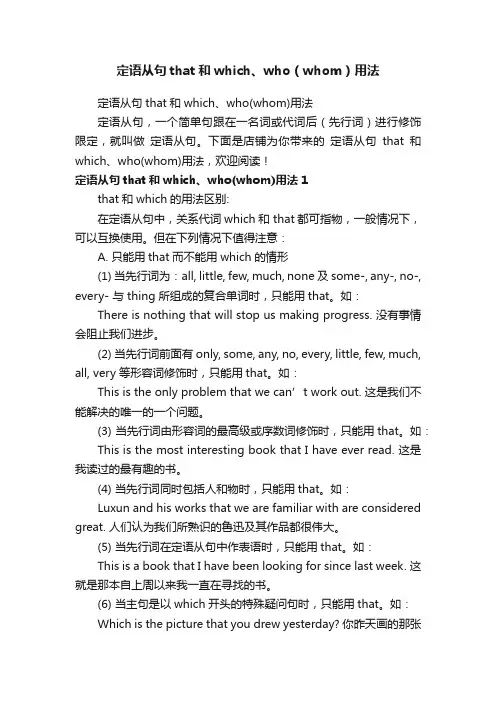
定语从句that和which、who(whom)用法定语从句that和which、who(whom)用法定语从句,一个简单句跟在一名词或代词后(先行词)进行修饰限定,就叫做定语从句。
下面是店铺为你带来的定语从句that和which、who(whom)用法,欢迎阅读!定语从句that和which、who(whom)用法1that和which的用法区别:在定语从句中,关系代词which和 that都可指物,一般情况下,可以互换使用。
但在下列情况下值得注意:A. 只能用that而不能用which的情形(1) 当先行词为:all, little, few, much, none 及 some-, any-, no-, every- 与 thing 所组成的复合单词时,只能用that。
如:There is nothing that will stop us making progress. 没有事情会阻止我们进步。
(2) 当先行词前面有only, some, any, no, every, little, few, much, all, very等形容词修饰时,只能用that。
如:This is the only problem that we can’t work out. 这是我们不能解决的唯一的一个问题。
(3) 当先行词由形容词的最高级或序数词修饰时,只能用that。
如:This is the most interesting book that I have ever read. 这是我读过的最有趣的书。
(4) 当先行词同时包括人和物时,只能用that。
如:Luxun and his works that we are familiar with are considered great. 人们认为我们所熟识的鲁迅及其作品都很伟大。
(5) 当先行词在定语从句中作表语时,只能用that。
如:This is a book that I have been looking for since last week. 这就是那本自上周以来我一直在寻找的书。
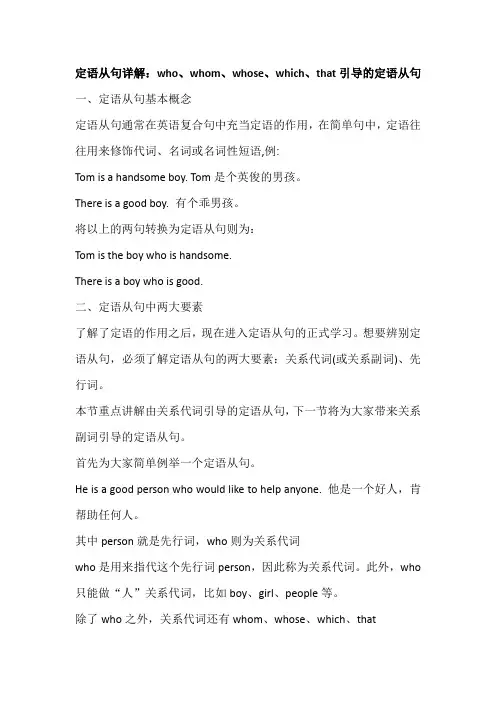
定语从句详解:who、whom、whose、which、that引导的定语从句一、定语从句基本概念定语从句通常在英语复合句中充当定语的作用,在简单句中,定语往往用来修饰代词、名词或名词性短语,例:Tom is a handsome boy. Tom是个英俊的男孩。
There is a good boy. 有个乖男孩。
将以上的两句转换为定语从句则为:Tom is the boy who is handsome.There is a boy who is good.二、定语从句中两大要素了解了定语的作用之后,现在进入定语从句的正式学习。
想要辨别定语从句,必须了解定语从句的两大要素:关系代词(或关系副词)、先行词。
本节重点讲解由关系代词引导的定语从句,下一节将为大家带来关系副词引导的定语从句。
首先为大家简单例举一个定语从句。
He is a good person who would like to help anyone. 他是一个好人,肯帮助任何人。
其中person就是先行词,who则为关系代词who是用来指代这个先行词person,因此称为关系代词。
此外,who 只能做“人”关系代词,比如boy、girl、people等。
除了who之外,关系代词还有whom、whose、which、that其中,值得注意的是,当定语从句修饰一个“人”时,选择关系代词必须了解先行词在从句中的位置才能做出决定,我们可以用拆分复合句的方法来判断。
例:1.He is a good person who would like to help anyone. 他是一个好人,肯帮助任何人。
拆分后:He is a good person.The person would like to help anyone.拆分后可以发现,先行词在第二句中做主语,因此用who.2.He is the man whom I met yesterday.拆分后:He is the man.I met the man yesterday.拆分后可以发现,先行词在第二句中做宾语,因此用whom.当需要使用修饰“物”的关系代词时,例句是这样的:1.This is a car which(that) is red.拆分后:This is a car.The car is red拆分后发现,先行词在第二句中做主语.2.This is the book which you gave me yesterday.拆分后:This is the book.You gave me the book yesterday拆分后发现,先行词在第二句中做宾语3.This is the room in which you were born.拆分后:This is the room.You were born in the room拆分后发现,先行词在第二句中做宾语。
who引起什么从句一、who引导的从句1. who引导的定语从句who在句中引导定语从句,修饰某个名词或代词,引导定语从句起定语作用,相当于一个形容词,放在被修饰的词前面修饰它,例如:The girl who smiles is Cindy.(那个微笑的女孩是辛迪。
)2. who引导的状语从句who在句中引导状语从句,作状语,表示时间、地点、原因、条件、方式等修饰动词,例如:We met the girl who we had met before.(我们见到了之前见过的那个女孩。
)3. who引导的主语从句who在句中引导主语从句,作主语,who指人,who前面动词要用三单,在句子中充当主语,例如:Who will come to the party? (谁来参加聚会?)4. who引导的宾语从句who在句中引导宾语从句,作宾语,who指人,who前面动词要用二单,在句子中充当宾语,例如:I don’t know who you love.(我不知道你爱谁。
)二、who在句中的用法1. who是宾补,在句中做主语、宾语时,都要和who或whom搭配使用,who作主补,动词要用三单,而who作宾补时,动词要用二单,例如:He is singing a song who his parents like.(他正在唱一首他父母喜欢的歌。
)2. 在句中作定语,如果who后面跟着定语从句时,who可以改为which (代替非人称),例如:This is the car which my father bought.(这是我父亲买的车。
)3. who可以用在that指代的名词从句中,并且作主谓宾,省略主语,例如:I don’t believe everything ( t hat )who he said.(我不相信他所说的一切。
)总结:1. who在句中引导定语从句,状语从句,主语从句和宾语从句,作这些成分的关联词,常见的搭配是that,whom,which等。
which who whom whose的用法Which Who Whom Whose 的用法1. Which的用法•用于描述非人的事物或概念,常用于从句中作为关系代词或连接副词。
•通常跟在名词之后,用于提供额外的信息。
例句: - The book, which is on the table, is mine.(这本书在桌子上,是我的。
) - I bought a new laptop, which is very expensive.(我买了一台新的笔记本电脑,非常贵。
)2. Who的用法•用于描述人,常用作主语或谓语从句中的关系代词。
例句: - The man who is standing over there is my teacher.(站在那边的那个人是我的老师。
) - She is the one who won the competition.(她是那个赢得比赛的人。
)3. Whom的用法•用于描述人时,常用作宾语或介词后的宾语。
例句: - To whom did you give the present?(你把礼物给了谁?) - The person whom I saw yesterday is my neighbor.(我昨天看到的那个人是我的邻居。
)4. Whose的用法•表示所属关系,常用于修饰名词。
例句: - This is the house whose roof was damaged by the storm.(这是那座屋顶被风暴损坏的房子。
) - The girl, whose father is a doctor, wants to be a nurse.(那个父亲是医生的女孩想要成为一名护士。
)以上是which, who, whom, whose的主要用法简介。
根据具体的句子结构和语境,它们可以有更多的灵活用法。
在使用时,要特别注意主谓一致和成分的搭配,以避免使用错误。
九年级英语which和who引导的定语从句语法规律总结一、which引导的定语从句1. which引导的定语从句所修饰的先行词是物,引导词which在从句中可作主语、宾语或表语。
This is the book which you want .这就是你想要的那本书。
2.which和介词搭配使用,介词可放在which之前若是固定词组,一般不能拆开。
The room in which there is a machine is a workshop.有机械的那个房间是一个车间This is the magazine which you are looking for.这就是你正在找的那本杂志二、who引导的定语从句who引导的定语从句所修饰的先行词是人,引导词who在从句中作主语.如果先行词指人,引导词在从句中作宾语,那么引导词要用who的宾格whom。
This is the man who helped me形式这就是帮助过我的那个人Do you know the person who spoke just now ?你认识刚才讲话的那个人吗!三、定语从句中引导词的省略1.无论定语从句修饰的是人还是物,只要引导词在定语从句中作宾语,引导词就可以省略。
因为省略后的定语从句仍然是完整的,有主语和谓语,我们仍然可以分辨出哪部分是定语从句。
Is that the car (that /which ) you bought last month ?这是你上个月买的那辆车吗A friend is a person (who/ whom) you know very well.朋友是你十分了解的人2.如果引导词在从句中作主语,引导词不可以省略,否则会造成结构混乱。
I’d lov e to have a teacher who is good at speaking我想有一位擅长演讲的老师He can make lessons that are usually boring interesting.他能把通常枯燥乏味的课讲得生动有趣3.关系代词在从句中作介词宾语时也可省略。
who, which引导的定语从句在复合句中,修饰某一名词或代词的从句叫定语从句。
它的作用相当于一个形容词。
定语从句通常位于它所修饰的名词或代词之后,这一名词或代词叫先行词,引导定语从句的关联词为关系代词(副词)。
这里主要介绍关系代词who与which的用法。
关系代词who(whom)和which均可引导定语从句,who用来指人,而which指物,在从句中充当主语或宾语。
请看例句:
We shall never forget Mr Li who taught us English in the middle school. 我们永远不会忘记中学时教我们英语的李老师。
(who在从句中作主语)
The man who(m) you saw last week has left the town. 上周你看见的那
个人已离开这个城镇了。
(whom也可用who, 在从句中作saw的宾语)
【温馨提示】关系代词在从句中作宾语时,常可省略。
如:
He told a story which moved us deeply. 他讲了一个使我们深受感动的故事。
(which在从句中作主语)
This is a reason which we must not forget. 这是我们不能忘记的一个原因。
(which在从句中作宾语)
需要指出的是关系代词which和that都可指物,一般情况下可以互换。
如:
The house which / that you lived in is a very old building. 你住的那个房子是座古老的建筑。
但在下列情况中,通常用which, 不用that。
当先行词有指示代词修饰时。
如:
The lady did not want that one which smelt terrible. 那位夫人不要气味难闻的那个。
当关系代词前有介词时。
如:
The room in which my family live used to be a garage.我家住的房间以前是个车库。
当先行词本身为that时。
如:
That which you told him about is what we want to know. 你告诉他的正是我们想知道的。